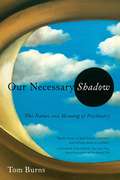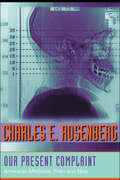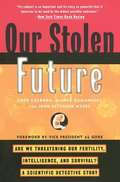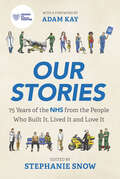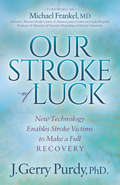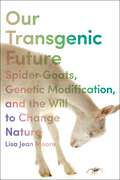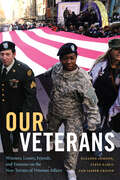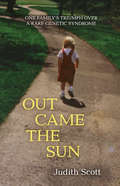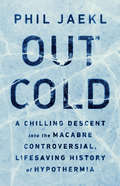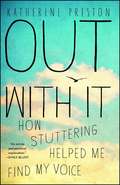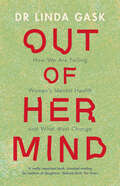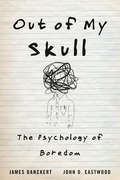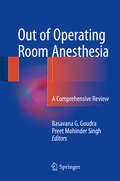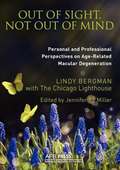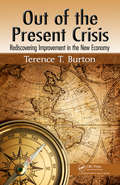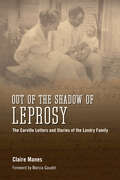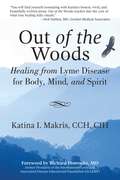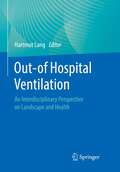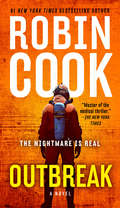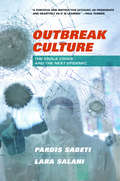- Table View
- List View
Our Necessary Shadow: The Nature and Meaning of Psychiatry
by Tom BurnsThe first attempt in forty years to explain the full subject of psychiatry, from one of the world's experts. In what will be a tour de force in the field of psychiatry in all its complexity and depth, this important new volume explores the essential paradox of psychiatry--and offers a balanced understanding of its history and development in the medical world. Much is written about psychiatry, but very little that describes psychiatry itself. Why should there be such a need? For good or ill, psychiatry is a polemical battleground, criticized on the one hand as an instrument of social control, while on the other the latest developments in neuroscience are trumpeted as lasting solutions to mental illness. Which of these strikingly contrasting positions should we believe? This is the first attempt in a generation to explain the whole subject of psychiatry. in this deeply thoughtful, descriptive, and sympathetic book, Tom Burns reviews the historical development of psychiatry, throughout alert to where psychiatry helps, and where it is imperfect. What is clear is that mental illnesses are intimately tied to what makes us human in the first place. and the drive to relieve the suffering they cause is even more human. Psychiatry, for all its flaws, currently represents our best attempt to discharge this most human of impulses. it is not something we can just ignore. it is our necessary shadow.
Our Present Complaint: American Medicine, Then and Now
by Charles E. RosenbergCharles E. Rosenberg, one of the world's most influential historians of medicine, presents a fascinating analysis of the current tensions in American medicine. Situating these tensions within their historical and social contexts, Rosenberg investigates the fundamental characteristics of medicine: how we think about disease, how the medical profession thinks about itself and its moral and intellectual responsibilities, and what prospective patients—all of us—expect from medicine and the medical profession. He explores the nature and definition of disease and how ideas of disease causation reflect social values and cultural negotiations. His analyses of alternative medicine and bioethics consider the historically specific ways in which we define and seek to control what is appropriately medical. At a time when clinical care and biomedical research generate as much angst as they offer cures, this volume provides valuable insight into how the practice of medicine has evolved, where it is going, and how lessons from history can improve its prognosis.
Our Stolen Future: Are We Threatening Our Fertility, Intelligence, and Survival? A Scientific Detective Story
by Theo Colborn Dianne Dumanoski John Peterson MyersOver thirty years ago, Rachel Carson's Silent Spring first warned that man-made chemicals were taking a deadly toll on birds and wildlife. Only now, however, are we recognizing the full consequences of this insidious threat, which is derailing sexual development and reproduction-not only in a host of animal populations but, it appears, in humans as well. Written by two leading environmental scientists and an award-winning environmental journalist, Our Stolen Future has already become one of the most controversial and talked-about books of the decade. Picking up where Silent Spring left off, this groundbreaking work gives an utterly gripping account that traces birth defects, sexual abnormalities, and reproductive failures in wildlife to their source-synthetic chemicals that mimic natural hormones, upsetting normal reproductive and developmental processes. And humans appear far from immune to the effects of these "hormone impostors." Male sperm counts have dropped as much as 50 percent in recent decades, while women have suffered a dramatic rise in hormone-related cancers, endometriosis, and other disorders. By threatening the ability to reproduce, these chemicals may be invisibly undermining the human future. Piecing together the clues, the authors detail how these industrial pollutants have spread with ease through the web of life from the equator to the poles, and explore what we can and must do to combat this invasion. Timely, urgent, and scrupulously reported, this riveting story of scientific detection will have a major impact on public debate for decades to come. It is indispensable for those concerned about the profound human impact on the environment, the well-being of our children, and the survival of our species.
Our Stories: 75 Years of the NHS from the People Who Built It, Lived It and Love It
by Stephanie SnowFOREWORD BY ADAM KAY, AUTHOR OF THIS IS GOING TO HURTPortion of proceeds go to NHS Charities Together.A beautiful and heart-warming collection of stories, this landmark publication tells, for the first time ever, the rich history of the NHS through the ordinary people who have experienced it.Founded on the concept of providing healthcare to rich and poor alike, the National Health Service (NHS) has been at the heart of our everyday experiences of life and death since 1948.From Joan Meredith, who stood on street corners in the freezing winter to campaign for a new health system, to one of the first patients diagnosed with HIV/Aids, Jonathan Blake, and Klarissa Velasco, who comforted and held the hands of people suffering from Covid-19, Our Stories follows our health service from its conception to today, and tells the many incredible stories that have happened throughout its lifetime.Filled with tales of every part of life, this beautiful book tells, for the first time ever, the moving history of our world-leading health service through the voices of the patients, nurses, doctors, porters and ordinary people who have turned it into the beating heart of our country. It is a heart-warming account of an amazing institution.
Our Stroke of Luck: New Technology Enables Stroke Victims to Make a Full Recovery
by J. Gerry PurdyMost people think that stroke victims end up looking like Frankenstein with a horrible facial expression and erratic movements. But, that is not the way it has to be. Today, it is possible for some stroke victims to make a full recovery. Gerry Purdy knows this because his wife, Alicia – a healthy, beautiful and smart person – suffered a stroke on August 23, 2011 and was able to return to her vivacious self.Our Stroke of Luck portrays the life they had together. Gerry and Alicia had dated in high school and got back together for their 45th high school reunion. Life was good. And then – Bam! – without warning Alicia suffered a stroke. Find out how Alicia’s neurosurgeon was able to remove the clot from her brain that caused the stroke. Experience the tense ups and downs of that night—one moment seeming as though she might be paralyzed on her left side for the rest of her life and then the next seeing a flash of hope. Gerry and Alicia were lucky that the radiologist was able to identify the clot in her brain and lucky to get her transferred to the Marcus Stroke Center at Grady Hospital in Atlanta. They were lucky that Dr. Nogueira was able to extract the clot from Alicia’s brain. And, finally, they were lucky that she was able to make a full recovery. Truly, this was their stroke of luck.
Our Transgenic Future: Spider Goats, Genetic Modification, and the Will to Change Nature
by Lisa Jean MooreHow scientific advances in genetic modification will fundamentally change the natural worldThe process of manipulating the genetic material of one animal to include the DNA of another creates a new transgenic organism. Several animals, notably goats, mice, sheep, and cattle are now genetically modified in this way. In Our Transgenic Future, Lisa Jean Moore wonders what such scientific advances portend. Will the natural world become so modified that it ceases to exist? After turning species into hybrids, can we ever get back to the original, or are they forever lost? Does genetic manipulation make better lives possible, and if so, for whom?Moore centers the story on goats that have been engineered by the US military and civilian scientists using the DNA of spiders. The goat’s milk contains a spider-silk protein fiber; it can be spun into ultra-strong fabric that can be used to manufacture lightweight military body armor. Researchers also hope the transgenically produced spider silk will revolutionize medicine with biocompatible medical inserts such as prosthetics and bandages. Based on in-depth research with spiders in Florida and transgenic goats in Utah, Our Transgenic Future focuses on how these spidergoats came into existence, the researchers who maintain them, the funders who have made their lives possible, and how they fit into the larger science of transgenics and synthetics. This book is a fascinating story about the possibilities of science and the likely futures that may come.
Our Veterans: Winners, Losers, Friends, and Enemies on the New Terrain of Veterans Affairs
by Suzanne Gordon Steve Early Jasper CravenIn Our Veterans, Suzanne Gordon, Steve Early, and Jasper Craven explore the physical, emotional, social, economic, and psychological impact of military service and the problems that veterans face when they return to civilian life. The authors critically examine the role of advocacy organizations, philanthropies, corporations, and politicians who purport to be “pro-veteran.” They describe the ongoing debate about the cost, quality, and effectiveness of healthcare provided or outsourced by the Department of Veterans Affairs (VA). They also examine generational divisions and political tensions among veterans, as revealed in the tumultuous events of 2020, from Black Lives Matter protests to the Trump-Biden presidential contest. Frank and revealing, Our Veterans proposes a new agenda for veterans affairs linking service provision to veterans to the quest for broader social programs benefiting all Americans.
Out Came the Sun: One Family's Triumph over a Rare Genetic Syndrome
by Judith ScottSix years into their marriage, Judith and Greg Scott decided to have a child; they were blessed with the birth of beautiful Emily. But their euphoria was short lived when their child was diagnosed with a rare and disabling condition: Partial Trisomy 13. Emily, they were told, would never walk, talk or read. From this tragic beginning unfolds the astonishing, life-altering journey of Out Came the Sun. Emily struggles to learn life's simple tasks, lagging far behind her peers. And the strains on her parents' marriage nearly cause it to come apart at the seams. But when Emily starts exceeding her doctor's expectations, Judith realizes that she too can overcome adversity by opening her life to more love and more children. This riveting, beautiful memoir demonstrates that extraordinary fortitude requires to take misfortune and valiantly turn it into triumph.
Out Cold: A Chilling Descent into the Macabre, Controversial, Lifesaving History of Hypothermia
by Phil Jaekl&“A fascinating look into the strange and sometimes unbelievable history of hypothermic medicine. Jaekl weaves together a story that is part history lesson and part science thriller. This is truly a must-read for any fan of science and science fiction!&” —Douglas Talk, MD/MPH, chief medical consultant, SpaceWorks Inc., Human Torpor Project The meaning of the word &“hypothermia&” has Greek origins and roughly translates to &“less heat.&” Its symptoms can be deadly—shivering, followed by confusion, irrationality, and even the illusion of feeling hot. But hypothermia has another side—it can be therapeutic. In Out Cold, science writer Phil Jaekl chronicles the underappreciated story of human innovation with cold, from Ancient Egypt, where it was used to treat skin irritations, to eighteenth-century London, where scientists used it in their first explorations of suspended animation. Throughout history, physicians have used cold to innovate life extension, enable distant space missions, and explore consciousness. Hypothermia may still conjure macabre images, like the bodies littering Mt. Everest and disembodied heads in cryo-freezers, but the reality is that modern science has invented numerous new life-saving cooling techniques based on what we&’ve learned over the centuries. And Out Cold reveals a surprisingly warm future for this chilling state.
Out Of Sight: Blind And Doing All Right
by Art Schreiber Hal SimmonsA high level radio news broadcast executive, Art Schreiber suddenly lost his eyesight. At the top of his career as a radio station general manager, Art awoke one morning at a resort near Santa Fe, New Mexico, unable to see. His world was in complete darkness. After facing total despair, Art plotted his return to the top while learning to live life in a new way in a new world. Art's refusal to fold his tent when his eyesight failed and his struggle to live life to the fullest will inspire any person who reads his story. Art's greatest reward in life is encouraging and motivating others who face similar challenges.
Out With It
by Katherine PrestonA vividly powerful memoir of a young woman who fought for years to change who she was until she finally found her voice and learned to embrace her imperfection. Imagine waking up one day to find your words trapped inside your head, leaving you unable to say what you feel, think, want, or need. At the age of seven that happened to Katherine Preston. From that moment, she began battling her stutter and hiding her shame by denying there was anything wrong. Seventeen years later, exhausted and humiliated, she made a life-changing decision: to leave her home in London and spend a year traveling around America meeting hundreds of stutterers, speech therapists, and researchers. What began as a vague search for a cure became a journey that debunked the misconceptions shrouding the condition, and a love story that transformed her conception of what it means to be normal. Shedding light on an ancient condition that affects approximately 4 million people in the United States and 60 million people worldwide, Preston has assembled an anthology of expertise and experience. In addition to specialists in the field, she interviews celebrities, writers, musicians, social workers, psychologists, and financiers--men and women from all walks of life battling their difficulties with speech. A heartwarming memoir and a journalistic feat, Out With It is more than a chronicle of one of the most prevalent speech problems in the world; it's a story about understanding yourself, and learning to embrace the voice within.
Out of Her Mind: How We Are Failing Women's Mental Health and What Must Change
by Linda GaskFor centuries so called 'difficult women' have been labelled as 'hysterical' and 'out of their minds'. Today they wait longer for health diagnoses, often being told it's 'all in their heads'. Although healthcare systems are overburdened, why are women the first to feel the effects of this? Why is it so hard for women to find the kind of help they need? Why is no one listening to them? And why have so many lost faith in mental healthcare? Drawing on the lived experiences of women, alongside expert commentators, recent history, current events, and her own personal and professional experience, Dr Linda Gask explores women's mental healthcare today. In doing so she confronts her role as a psychiatrist, recalling experiences treating women and as a woman who has received mental healthcare, illustrating the dire need for more change, faster. Women can't all be out of their minds.
Out of My Skull: The Psychology of Boredom
by James Danckert John D. EastwoodNo one likes to be bored. Two leading psychologists explain what causes boredom and how to listen to what it is telling you, so you can live a more engaged life. We avoid boredom at all costs. It makes us feel restless and agitated. Desperate for something to do, we play games on our phones, retie our shoes, or even count ceiling tiles. And if we escape it this time, eventually it will strike again. But what if we listened to boredom instead of banishing it? Psychologists James Danckert and John Eastwood contend that boredom isn’t bad for us. It’s just that we do a bad job of heeding its guidance. When we’re bored, our minds are telling us that whatever we are doing isn’t working—we’re failing to satisfy our basic psychological need to be engaged and effective. Too many of us respond poorly. We become prone to accidents, risky activities, loneliness, and ennui, and we waste ever more time on technological distractions. But, Danckert and Eastwood argue, we can let boredom have the opposite effect, motivating the change we need. The latest research suggests that an adaptive approach to boredom will help us avoid its troubling effects and, through its reminder to become aware and involved, might lead us to live fuller lives. Out of My Skull combines scientific findings with everyday observations to explain an experience we’d like to ignore, but from which we have a lot to learn. Boredom evolved to help us. It’s time we gave it a chance.
Out of Operating Room Anesthesia: A Comprehensive Review
by Basavana G. Goudra Preet Mohinder SinghThis book covers all aspects of out of operating room anesthesia and deep sedation practice. The practical aspects of anesthesia are emphasized, with particular stress on management of un-anticipated adverse events. A concise, yet comprehensive description of relevant basic sciences is also included. Although the contributors are predominantly North American, essential elements of out of OR practice in countries other than the USA are incorporated.Situations like those that contributed to the death of Joan Rivers are addressed with particular emphasis on their recognition, prevention and management. The importance of safety as the key element in providing anesthesia in remote or unfamiliar areas is highlighted and discussed. A lack of accurate documentation is a major drawback in out of OR anesthesia practice and the reader is drawn to the importance of documentation, both from a practical and medico legal standpoint. A separate chapter deals with research and future directions in out of OR anesthesia. Out of Operating Room Anesthesia: A Comprehensive Review, is primarily aimed at all anesthesia providers: anesthesiologists, nurse anesthetists and residents. Specific chapters such as dental anesthesia, anesthesia for ER procedures and sedation for cosmetic procedures will be useful as a reference guide to physicians exposed to brief training in anesthesia during their non-anesthesia residency program.
Out of Sight, Not Out of Mind: Personal and Professional Perspectives on Age-Related Macular Degeneration
by Lindy BergmanOut of Sight, Not Out of Mind presents a personal account of living successfully with age-related macular degeneration (AMD), combined with powerful new information on effective service delivery. Ninety-three-year old Lindy Bergman illustrates the ways in which life with low vision can be lived with independence, dignity, and personal satisfaction. Also included are highly informative chapters, written by the world-renowned experts from The Chicago Lighthouse for People Who are Blind or Visually Impaired, encompassing the latest information about the causes and treatment of AMD; a concise, informative overviews of the effects of aging on vision, the emotional and psychological components of vision loss and the integration of the individual's psychological recovery into low vision service delivery; and a cutting-edge model of rehabilitation that meets the challenges of service provision today. Foreword by Jonathan Safran Foer, award-winning author of Everything Is Illuminated and Extremely Loud and Incredibly Close.
Out of the Gray, into the Light: A Mother Stands Up for Her Daughter and Herself in a Fight for Survival—A Memoir of Advocacy and Hope
by Amy PostAmy Post&’s Out of the Gray, into the Light is a gut-wrenching story of parental helplessness following their daugther&’s diagnosis of malignant liver cancer, and it shares the raw, unfiltered emotions of a family suddenly sucked into a healthcare system that often leaves weakened patients to stand silent and alone, in desperate need of an advocate.&“Now I know what it is to advocate for someone, to put everything I have into something outside of myself.&” —Amy Post &“Your daughter has malignant liver cancer.&” For Amy Post and her family, the doctor&’s words shook their world and changed the trajectory of their lives forever. When Amy received a call from her children&’s school telling her that her daughter wasn&’t playing but was instead sitting down on the playground, her mind went into high alert. For months, she&’d had a nagging suspicion that something wasn&’t right with her three-year-old. Exhaustion, random fevers, and now this. Amy and her husband were not prepared, though, for the devastating diagnosis. Nor were they ready for the unveiling of a rare gene that promised not one, but three devastating forms of cancer throughout their child&’s life—if she survived this one. In her book, Amy Post shares the raw, unfiltered emotions of a family suddenly sucked into a healthcare system that runs as a machine but often leaves weakened patients to stand silent and alone and in desperate need of an advocate. It&’s a gut-wrenching story of parental helplessness that grows into a mother&’s determination and fierce fight for survival for her daughter—and then for herself.
Out of the Present Crisis: Rediscovering Improvement in the New Economy
by Terence T. BurtonToday, organizations have achieved an overall failure rate above 80 percent with Lean, Six Sigma, Lean Six Sigma, and continuous improvement in general. This is certainly not due to a shortage of books, consultants, and other online resources about the methodologies and tools, or the success stories of Toyota and others. However, it is due to a shortage of knowledge and practice about the most critical success factors of improvement: leadership, sustaining infrastructure, behavioral and cultural transformation, and now emerging technology. These factors produce 90 percent of the success with continuous and sustainable improvement; the methodologies and tools represent an irrelevant 10 percent. For decades, most organizations have focused on this quick and easy, irrelevant 10 percent through an endless series of fad, in-vogue improvement programs as they attempt to mimic the best-in-class practices of the most successful organizations.Out of the Present Crisis: Rediscovering Improvement in the New Economy is the contemporary version of Deming’s famous 1982 book, "Out of the Crisis." The author builds a solid case for organizations to aggressively pursue the next generation of systematic and sustainable improvement through a combined strategy of Deming’s back-to-basics, innovation and breakthrough thinking, integration of emerging and enabling technology, and adaptive improvement across diverse environments and industries. The book’s practical, pragmatic style is backed up by many real world examples and personal experiences.If you're looking for another book about Lean or Six Sigma "tools" this is not it. But it is a book about how to achieve lasting success by making improvement the cultural standard of excellence and living code of conduct in organizations. This popular book provides executives with an up-to-date and proven reference guide for rediscovering successful systematic and sustainable improvement in today’s economy. The author demonstrates the importance of viewing improvement as a continuous manageable "process" and covers the most critical success factors of leadership, sustaining infrastructure, behavioral and cultural transformation, and emerging technology in a practical, no-nonsense, "how-to-do" style. The book provides specific guidance for all industries including public and private corporations, hospitals, financial services, airlines, municipalities, and federal, state, and local governments.
Out of the Shadow of Leprosy: The Carville Letters and Stories of the Landry Family
by Claire ManesIn 1924 when thirty-two-year-old Edmond Landry kissed his family goodbye and left for the leprosarium in Carville, Louisiana, leprosy, now referred to as Hansen's disease, stigmatized and disfigured but did not kill. Those with leprosy were incarcerated in the federal hospital and isolated from family and community. Phones were unavailable, transportation was precarious, and fear was rampant. Edmond entered the hospital (as did his four other siblings), but he did not surrender to his fate. He fought with his pen and his limited energy to stay connected to his family and to improve living conditions for himself and other patients Claire Manes, Edmond's granddaughter, lived much of her life gripped by the silence surrounding her grandfather. When his letters were discovered, she became inspired to tell his story through her scholarship and his writing. Out of the Shadow of Leprosy: The Carville Letters and Stories of the Landry Family presents her grandfather's letters and her own studies of narrative and Carville during much of the twentieth century. The book becomes a testament to Edmond's determination to maintain autonomy and dignity in the land of the living dead. Letters and stories of the other four siblings further enhance the picture of life in Carville from 1919 to 1977.
Out of the Woods: Healing from Lyme Disease for Body, Mind, and Spirit
by Richard Horowitz Katina I. MakrisHope and practical help for Lyme disease sufferers everywhere.More than 300,000 people in the United States are diagnosed with Lyme disease every year, and many, many more are suffering from Lyme without knowing it. Katina Makris was one of those undiagnosed individuals who nearly died from the disease. At the peak of her career, classical homeopath and health-care columnist Katina Makris was stricken with a mysterious "flu.” Only after five years of torment-two completely bedridden-and devastating blows to her professional and family life was Katina’s illness finally diagnosed as Lyme disease. Out of the Woods not only shares the brutality of Lyme disease through the telling of Katina’s story, but it also describes her incredible journey back to full recovery, giving thousands of Lyme sufferers hope for their uncertain and frightening futures.Katina’s memoir is a gripping and inspiring story of healing through faith and perseverance, but Out of the Woods extends beyond Katina’s personal story. Putting her homeopathic training to work, Part Two of the book details the nuts and bolts of Lyme disease, offering readers up-to-date information on Eastern and Western treatments. Readers will learn about the importance of antibiotics as well as acupuncture, homeopathic remedies, energy restoration, and a path to emotional healing, affirming that complete healing from any disease encompasses body, mind, and spirit.
Out-of Hospital Ventilation: An Interdisciplinary Perspective on Landscape and Health
by Hartmut LangSafe handling of patient and device in home ventilation!This book offers all relevant contents of the further training "Basic qualification extra-clinical artificial respiration" and addresses itself to maintaining and responsible persons, who supply ventilated humans at home or in the nursing home. Learn comprehensive basics about anatomy, pathology and the different ventilation modes and benefit from the authors' wealth of experience. Here you can read in an easily understandable and concise manner how to provide your patients or residents with all-round competent care and how to handle the ventilation situation with confidence.Ideal for all employees and nursing services to train and qualify for the challenging care of ventilated patients!
Outback Encounter
by Meredith WebberTwo doctors — small town — big secret! Dr. Caitlin O'Shea's biggest problem is usually getting taken seriously as a research scientist — her stunning blond looks get in the way! So she's not expecting her work in tiny Outback town Turalla to have as many challenges as it does. Challenges such as remembering her clinical skills to help the town's overworked doctor. Discovering why that doctor, Connor Clarke, is so opposed to her research. And coping with what his irresistible smile does to her mind, body and heart!
Outback Engagement
by Meredith WebberFake engagement…real passion! Outback vet Tom Fleming has a problem with women — they want to marry him! After being featured in a magazine, the so-called "Lonely Country Bachelor" is surrounded by would-be wives, his ex and a hotshot reporter! Merriwee's new doctor, Anna Talbot, is beautiful, blond and engaged. So when Tom claims he gave her the ring, the fake fiancee ends all his woman troubles…except one. Because, as Tom and Anna face medical — and animal — emergencies together,Tom realizes that the woman he can't have is the only one he wants.
Outback Marriage
by Meredith WebberIt was bad enough that Blythe Jones had to sit next to — and dance with! — rude, challenging, dangerously attractive Cal Whitworth at the wedding. It was definitely too much when his plane crashed on the way back and the two doctors had to spend the night in the wild. And as for his plea that Blythe should work in his Outback practice while his broken arm healed...well! But for some reason Blythe agreed. And the more she saw Cal — his dedication, his caring, his unnervingly sexy smile — the harder it was to remember why she was off men....
Outbreak
by Robin CookMurder and intrigue reach epidemic proportions when a devastating plague sweeps the country. Dr. Marissa Blumenthal of the Atlanta Centers for Disease Control investigates--and soon uncovers the medical world's deadliest secret...
Outbreak Culture: The Ebola Crisis and the Next Epidemic
by Pardis SabetiAn award-winning genetic researcher and a tenacious journalist examine each phase of the Ebola epidemic in West Africa, the largest and deadliest of its kind. Their postmortem identifies factors that kept key information from reaching doctors, complicated the government’s response to the crisis, and left responders unprepared for the next outbreak.
